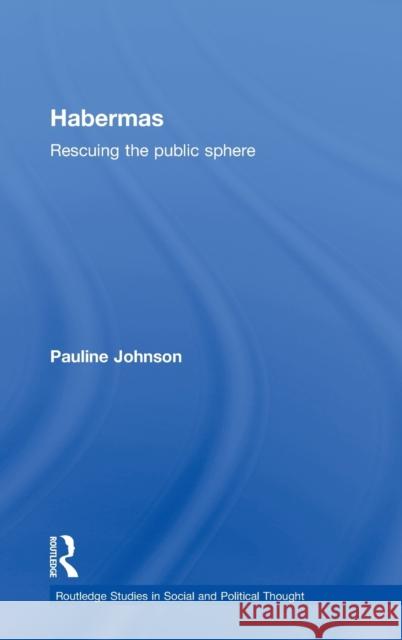Habermas: Rescuing the Public Sphere » książka
Habermas: Rescuing the Public Sphere
ISBN-13: 9780415367691 / Angielski / Twarda / 2006 / 224 str.
Habermas: Rescuing the Public Sphere
ISBN-13: 9780415367691 / Angielski / Twarda / 2006 / 224 str.
(netto: 744,80 VAT: 5%)
Najniższa cena z 30 dni: 705,23
ok. 16-18 dni roboczych.
Darmowa dostawa!
If we are to believe what many sociologists are telling us, the public sphere is in a near terminal state. Our ability to build solidarities with strangers and to agree on the general significance of needs and problems seems to be collapsing. These cultural potentials appear endangered by a newly aggressive attempt to universalize and extend the norms of the market. For the past four decades the social theorist Jürgen Habermas has explored the relevance and meaning of the public sphere, as well as diagnosing its on-going crises. In the contemporary climate, a systematic look at Habermas' lifelong project of rescuing the modern public sphere seems an urgent task. This study reconstructs major developments in Habermas' thinking about the public sphere. Throughout his work Habermas has maintained that the complex ambiguity of the cultural achievements and potentials of the Enlightenment have not been properly understood. While his first major work tried to retrieve this complexity by excavating the neglected public-democratic core of Enlightenment liberalism, his later writings look to processes within modernization that confer value on a human capacity to interact communicatively. In recent times, Habermas has suggested that the modern public sphere is still central to the way in which liberal democratic societies reflect upon their normative foundations, and that we can learn from the traumatic histories and partial successes of the democratic nation states what needs to be done to build democracy with a post-national, cosmopolitan reach.
Habermas' project of rescuing the neglected potentials of Enlightenment legacies has been deeply controversial. For many, it is too lacking in radical commitments to warrant its claim to a contemporary place within a critical theory tradition. Against this developing consensus, Pauline Johnson describes Habermas' project as one that is still informed by utopian energies, even though his own construction of emancipatory hopes itself proves to be too narrow and one-sided.











